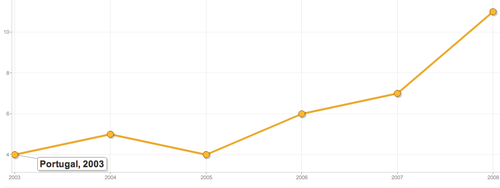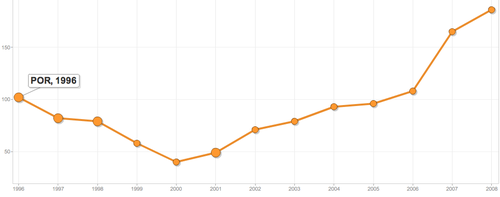A middle path between trying to motivate volunteers and hiring professionals.
CISV takes a lot of pride in being a volunteer organization. In fact, in Germany we always tell new families, how the IO ist he only place we're paying people to work for CISV. Of course, this is not entirely true, and there are several places , where the „volunteer-dogma" is being breached:
The natural solution for our organization would be to find a volunteer, that is a professional, to do that job. From the back of my head, I know at least 3 people with the necessary competence. Furthermore, you can expect an intrinstic motivation in a long-time CISVer to give something back to the organization that gave him fantastic experiences. However, there's a whole bunch of problems associated with volunteer solutions: People sometimes accept jobs that they later find out, don't have the resources to do. Then there is a problem of holding them accountable, if stuff isn't completed in time, because, after all, it was just a volunteer job.
The other logical option, would be to find a company, to do that job. Usually a contract is signed, with deadlines, and agreements, so you can be sure to some extent that the job is done with the quality and in the time agreed upon. However, these people will have no emotional connenction with the organization, and since CISV is usually not the number one client on the list, similar problems can appear as with volunteers. Finally, of course, professionals are more expensive than volunteers.
But, instead of thinking in black an white, there is also a third way, to solve this problem: Many a volunteer may be willing to donate a bigger chunk of effort into time-consuming projects, if payed a small compensation. Think of students, who need a student job anyway - why not have a student job with CISV? People could feel more responsible for doing something, if they receive money for it - even if it's just a small sum.
I'd like to coin this solution "pay-lunteering". A few examples:
Nevertheless this „third solution" should be kept in mind, when delegating new jobs, and especially, when volunteers are difficult to find.
CISV takes a lot of pride in being a volunteer organization. In fact, in Germany we always tell new families, how the IO ist he only place we're paying people to work for CISV. Of course, this is not entirely true, and there are several places , where the „volunteer-dogma" is being breached:
- Many NAs employ people as national secretaries. It seems, as this job is both so time-consuming and dull, that no volunteer would do this for very long
- The friends website was designed and programmed by an external company for quite some money
- In CISV Germany a traditional kitchen staff is often complemented with a full-time professional chef.
The natural solution for our organization would be to find a volunteer, that is a professional, to do that job. From the back of my head, I know at least 3 people with the necessary competence. Furthermore, you can expect an intrinstic motivation in a long-time CISVer to give something back to the organization that gave him fantastic experiences. However, there's a whole bunch of problems associated with volunteer solutions: People sometimes accept jobs that they later find out, don't have the resources to do. Then there is a problem of holding them accountable, if stuff isn't completed in time, because, after all, it was just a volunteer job.
The other logical option, would be to find a company, to do that job. Usually a contract is signed, with deadlines, and agreements, so you can be sure to some extent that the job is done with the quality and in the time agreed upon. However, these people will have no emotional connenction with the organization, and since CISV is usually not the number one client on the list, similar problems can appear as with volunteers. Finally, of course, professionals are more expensive than volunteers.
But, instead of thinking in black an white, there is also a third way, to solve this problem: Many a volunteer may be willing to donate a bigger chunk of effort into time-consuming projects, if payed a small compensation. Think of students, who need a student job anyway - why not have a student job with CISV? People could feel more responsible for doing something, if they receive money for it - even if it's just a small sum.
I'd like to coin this solution "pay-lunteering". A few examples:
- Swantje/GER used to be the national Summer Camp chair in Germany, when the position as national secretary became vacant. She dropped her usual student-jobs and works for CISV Germany next to attending University.
- Bebbe/SWE could probably be called "Paylunteer No.1", since he is employed by IO as the administration officer. While most other people at the international office became acquainted with CISV during their job interview, Bebbe is a long time Seminar Camp expert.
- Nic/GBR, formerly NJR and now trustee for Britain, spent a number of months in Stockholm, working at CISV Swedens national office as an EVS volunteer. In fact, this is probably a win-win-win solution because a) Nic got to spend a year abroad, b) CISV Sweden got a motivated staff and c) it was mostly payed by the EU.
Nevertheless this „third solution" should be kept in mind, when delegating new jobs, and especially, when volunteers are difficult to find.



![Reblog this post [with Zemanta]](http://img.zemanta.com/reblog_c.png?x-id=0abfd9b1-40da-42b6-8e09-33d25b933a45)
